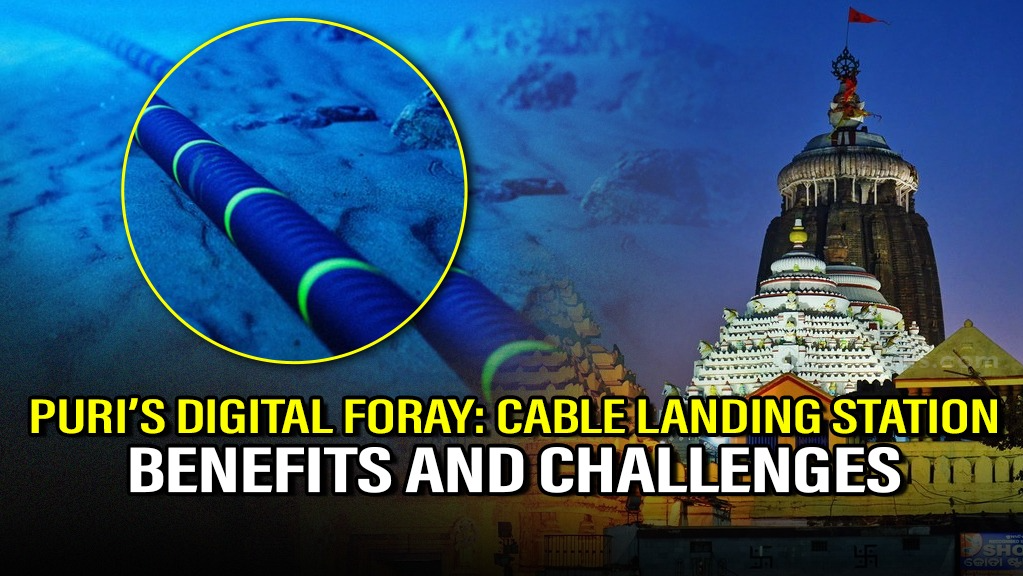

A Comprehensive Look at Puri's Cable Landing Station
Cable landing stations (CLS) are pivotal infrastructure, connecting high-capacity undersea fiber optic cables to land-based networks, enabling international telecommunications and internet traffic. The digital economy's reliance on robust infrastructure underscores the strategic importance of CLS development, particularly in rapidly digitalising nations like India. The Odisha government's initiative to establish a CLS in Puri, announced in March 2025, aims to enhance the state's digital capabilities. Let’s look and find into the project's potential economic benefits, infrastructure improvements, challenges, environmental considerations, and lessons from existing Indian CLS locations. Puri's strategic coastal location, scalability potential, and existing infrastructure make it an optimal site for this development.
The Economic Benefits:
The Puri CLS is expected to stimulate significant economic growth through direct international fiber connectivity. This connectivity attracts software development firms, online service providers, and multinational corporations, bringing investment in data centers and technology sectors. The project's development will create jobs openings for IT professionals and network engineers, boosting the local economy and fostering a skilled workforce. Enhanced connectivity supports related industries, including entertainment and banking, contributing to a dynamic digital ecosystem. Aligning with national objectives, the CLS strengthens India's global digital position and attracts foreign direct investment (FDI), leveraging Odisha's strategic location and infrastructure development.
Table 1: Potential Economic Benefits of Cable Landing Station in Puri
Benefit Category | Specific Examples/Details from Snippets | Potential Scale of Impact |
Investment | Data centers, top-tier technology players, hyperscalers, Global Capability Centers (GCCs) | Significant capital inflow, expansion of digital infrastructure |
Job Creation | Digital and IT sectors, thousands of jobs | Thousands of direct and indirect jobs |
Industry Growth | Entertainment, banking, cloud services, content delivery networks, IT support | Development of a comprehensive digital ecosystem |
Global Position | Critical node in global network, strengthens India's role in data-driven economy | Enhanced global competitiveness and influence |
FDI | Attraction of technology investments | Increased international capital and expertise |
Impact on Digital Infrastructure:
The Puri CLS will significantly enhance regional digital infrastructure by improving internet speed and reducing latency. Direct access to international fiber optic cables minimizes data travel distances, crucial for supporting digital demands. Increased bandwidth capacity supports data-intensive activities like video conferencing and cloud computing. The CLS strengthens Odisha's role in the global digital network, benefiting education, healthcare, and governance. The development of data centers and potential Internet Exchange Points (IXPs) is anticipated, improving internet performance and reducing costs. Businesses and consumers will benefit from enhanced e-commerce, communication, and overall digital experiences.
Challenges and Risks:
Implementing the Puri CLS presents several challenges. Project timelines, security concerns, and long-term maintenance require meticulous planning. Robust security protocols are essential to protect against physical and cyber threats. Long-term maintenance demands specialised expertise and resources. Puri's coastal location necessitates disaster resilience planning to mitigate natural hazards. Regulatory hurdles and competition from established CLS hubs like Mumbai and Chennai require strategic navigation.
Table 2: Potential Challenges and Risks Associated with the Puri CLS Project
Challenge/Risk Category | Specific Details/Concerns from Snippets | Potential Mitigation Strategies |
Implementation | Meeting the three-year timeline, DPR submission, stakeholder coordination | Efficient planning, proactive stakeholder engagement, timely approvals |
Security | Physical intrusion, cyber attacks, sabotage | Robust physical and cybersecurity measures |
Long-Term Maintenance | Specialized expertise, repair costs, regulatory hurdles, environmental concerns | Adequate investment, effective maintenance agreements |
Natural Hazards | Cyclones, storm surges, coastal erosion, sea-level rise | Robust structural design, protective measures, disaster recovery plans |
Regulatory | Complex permitting processes, multiple agencies | Streamlining processes, clear regulatory frameworks |
Competition | Existing hubs in India (Mumbai, Chennai, Kochi) | Offering strategic advantages, competitive pricing, efficient services |
Environmental Impacts:
Construction and operation of the Puri CLS will have environmental impacts. Cable laying can disturb marine ecosystems, and vessel operations can create noise pollution. Long-term effects of electromagnetic fields (EMFs) from submarine cables require ongoing monitoring. Climate change and natural disasters pose risks, necessitating resilient infrastructure designs. Adherence to Indian environmental regulations, including Environmental Impact Assessments (EIAs) and Coastal Zone Regulation (CRZ) clearances, is essential. A detailed assessment of local biodiversity and marine ecosystems is crucial to minimise potential harm.
Lessons to be learnt from other Locations in India:
India's existing CLS locations, including Mumbai, Chennai, and Kochi, offer valuable insights. Mumbai's experience highlights the economic and strategic benefits of multiple CLS. Chennai's growth as a data center hub underscores the importance of robust connectivity. Kochi demonstrates the transformative impact of CLS on regional development and digital inclusion. Common challenges include cable damage from fishing and natural hazards. Best practices involve stringent security protocols, environmental assessments, and stakeholder collaboration.
Table 3: Existing Cable Landing Stations in India
City | Operator(s) | Key Submarine Cables Landing | Brief Summary of Regional Impact |
Mumbai | Tata Communications, Bharti Airtel, Reliance Jio, Global Cloud eXchange, Sify, BSNL, Vodafone | 2Africa, Bay of Bengal Gateway, FALCON, IMEWE, India Asia Xpress, India Europe Xpress, MIST, SAFE, SEACOM/Tata TGN-Eurasia, SeaMeWe-6, Tata TGN-Tata Indicom | Major hub for global connectivity, supports significant financial transactions, thriving digital ecosystem |
Chennai | Tata Communications, Bharti Airtel, Reliance Jio, Global Cloud eXchange | i2i Cable Network, SEA-ME-WE 4, TIISCS, BRICS, Bay of Bengal Gateway, Gulf Bridge International, India Asia Xpress, India Europe Xpress, SeaMeWe-6 | Growing data center market, strategic location, strong international and domestic connectivity |
Kochi | Tata Communications | SAFE, SEACOM/Tata TGN-Eurasia, MIST, Kochi-Lakshadweep Islands Cable | Improved regional connectivity, supports strategic communication needs, potential for tourism growth |
Tuticorin | Bharti Airtel | Bharat Lanka Cable System | Regional connectivity |
Trivandrum | Global Cloud eXchange | SAFE, SEACOM/Tata TGN-Eurasia | Regional connectivity |
Puri CLS holds significant potential for economic growth and digital infrastructure enhancement in Odisha. Direct international fiber connectivity will improve internet speed and capacity, benefiting businesses and consumers. Addressing implementation challenges, security concerns, and environmental impacts is crucial. Learning from existing Indian CLS locations can inform best practices. With strategic planning and proactive measures, Puri can emerge as a key gateway for international connectivity, contributing to India's digital advancement.